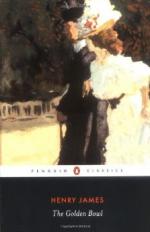“To concern yourself—?” He watched her as she faintly faltered, looking about her now so as not to keep always meeting his face.
“With what may have really become of you. It’s as if we had agreed from the first not to go into that—such an arrangement being of course charming for me. You can’t say, you know, that I haven’t stuck to it.”
He didn’t say so then—even with the opportunity given him of her stopping once more to catch her breath. He said instead: “Oh, my dear—oh, oh!”
But it made no difference, know as she might what a past—still so recent and yet so distant—it alluded to; she repeated her denial, warning him off, on her side, from spoiling the truth of her contention. “I never went into anything, and you see I don’t; I’ve continued to adore you—but what’s that, from a decent daughter to such a father? what but a question of convenient arrangement, our having two houses, three houses, instead of one (you would have arranged for fifty if I had wished!) and my making it easy for you to see the child? You don’t claim, I suppose, that my natural course, once you had set up for yourself, would have been to ship you back to American City?”
These were direct inquiries, they quite rang out, in the soft, wooded air; so that Adam Verver, for a minute, appeared to meet them with reflection. She saw reflection, however, quickly enough show him what to do with them. “Do you know, Mag, what you make me wish when you talk that way?” And he waited again, while she further got from him the sense of something that had been behind, deeply in the shade, coming cautiously to the front and just feeling its way before presenting itself. “You regularly make me wish that I had shipped back to American City. When you go on as you do—” But he really had to hold himself to say it.
“Well, when I go on—?”
“Why, you make me quite want to ship back myself. You make me quite feel as if American City would be the best place for us.”
It made her all too finely vibrate. “For ’us’—?”
“For me and Charlotte. Do you know that if we should ship, it would serve you quite right?” With which he smiled—oh he smiled! “And if you say much more we will ship.”
Ah, then it was that the cup of her conviction, full to the brim, overflowed at a touch! There was his idea, the clearness of which for an instant almost dazzled her. It was a blur of light, in the midst of which she saw Charlotte like some object marked, by contrast, in blackness, saw her waver in the field of vision, saw her removed, transported, doomed. And he had named Charlotte, named her again, and she had made him—which was all she had needed more: it was as if she had held a blank letter to the fire and the writing had come out still larger than she hoped. The recognition of it took her some seconds, but she might when she spoke have been folding up these precious lines and




